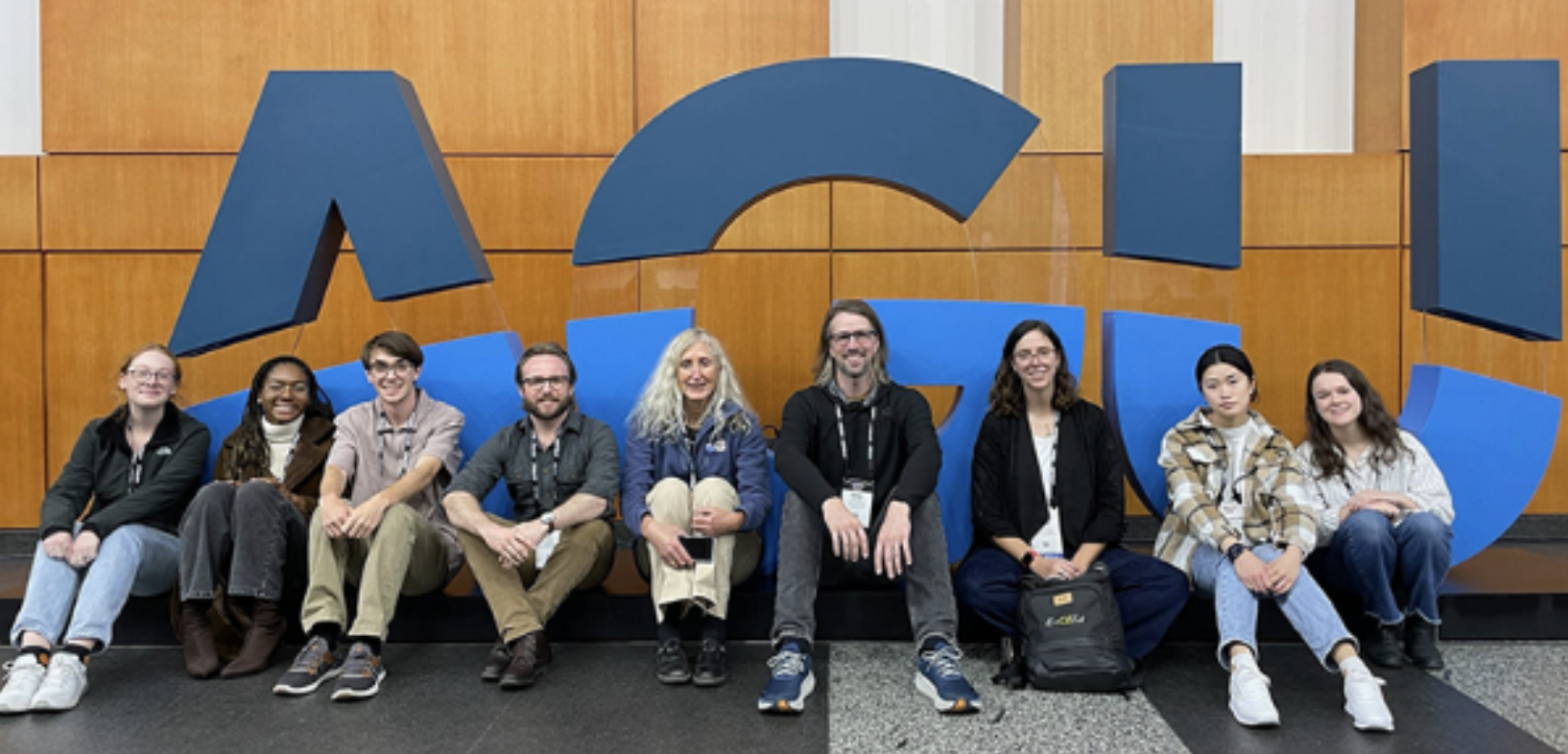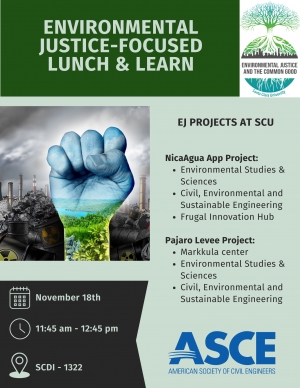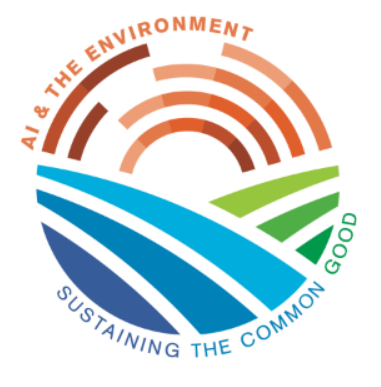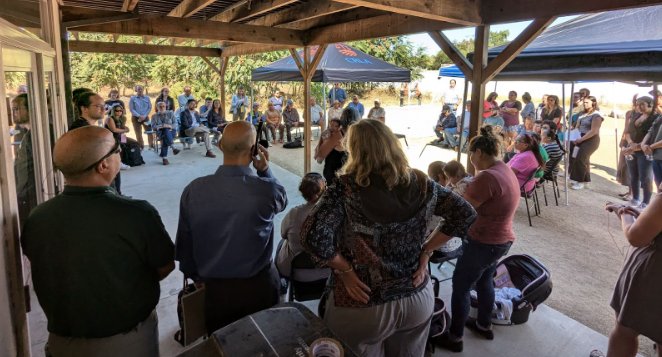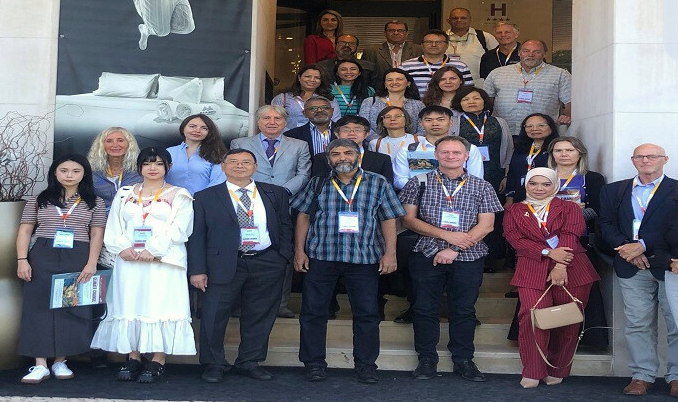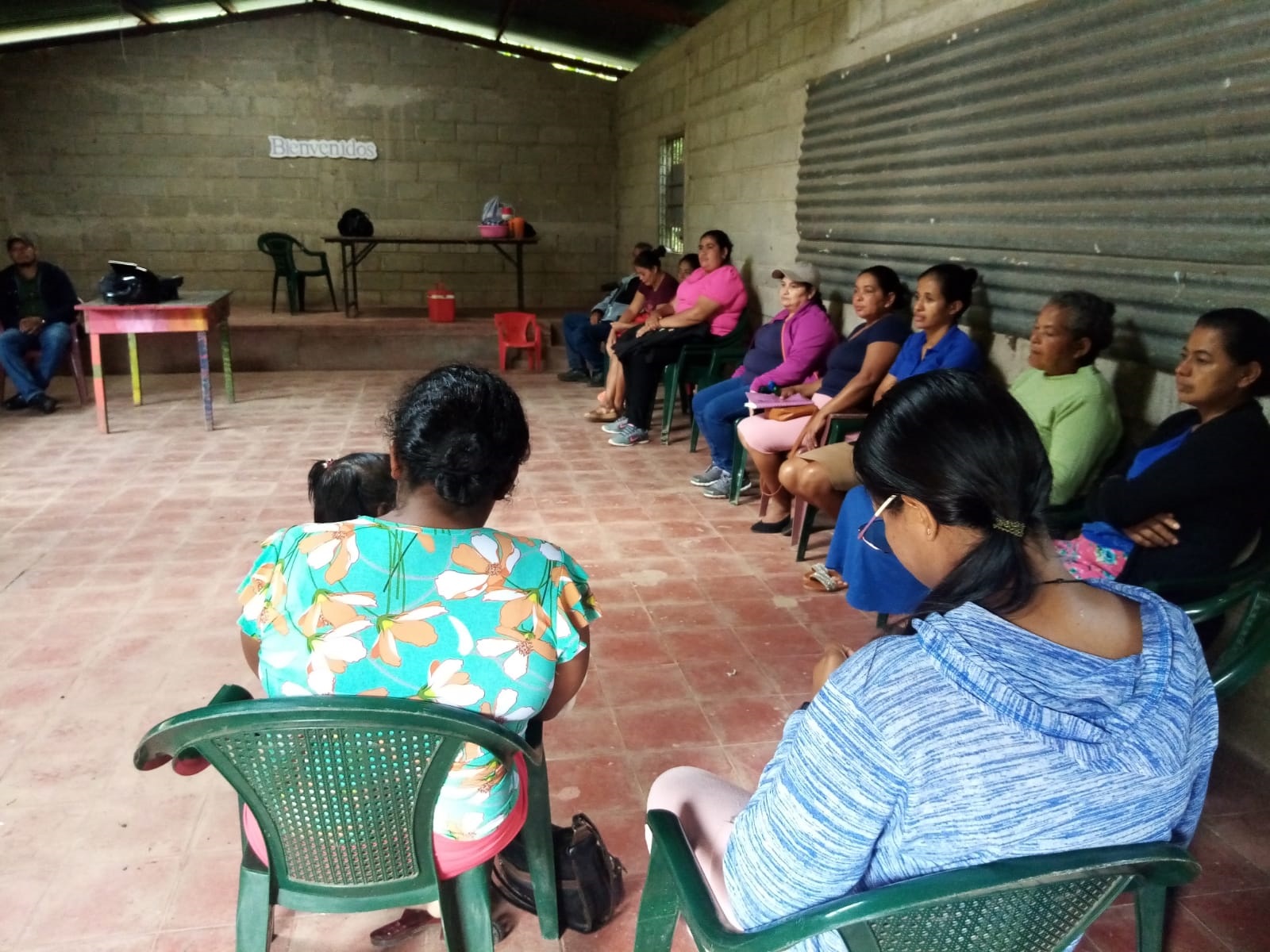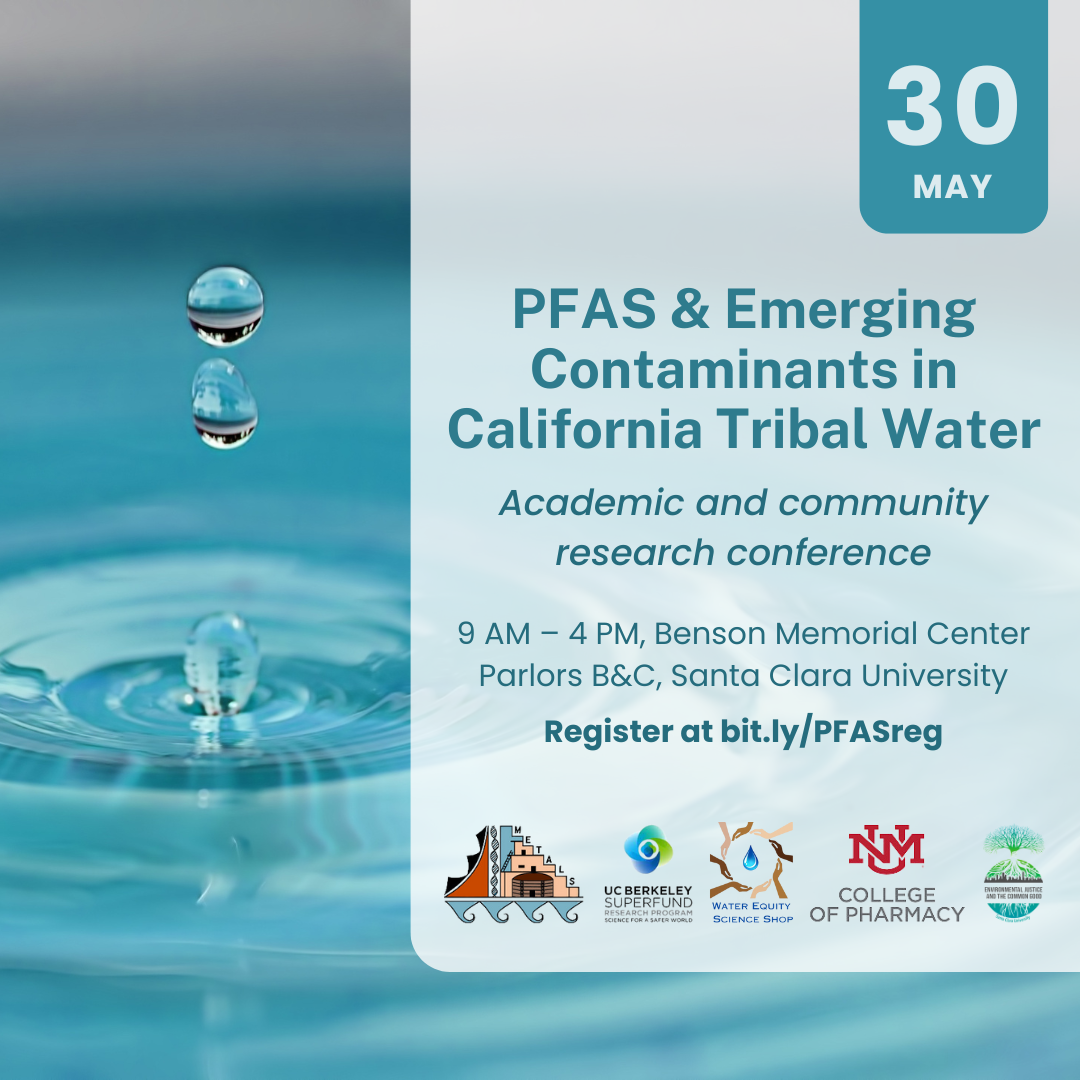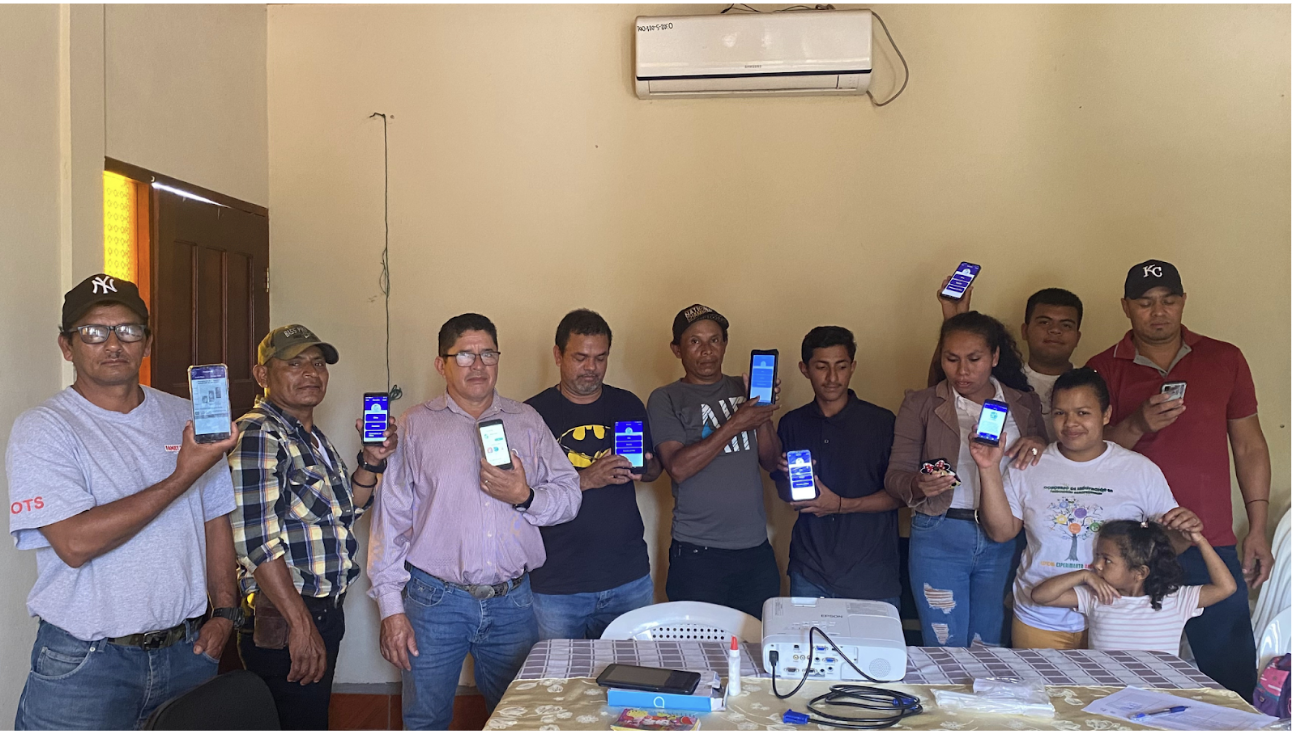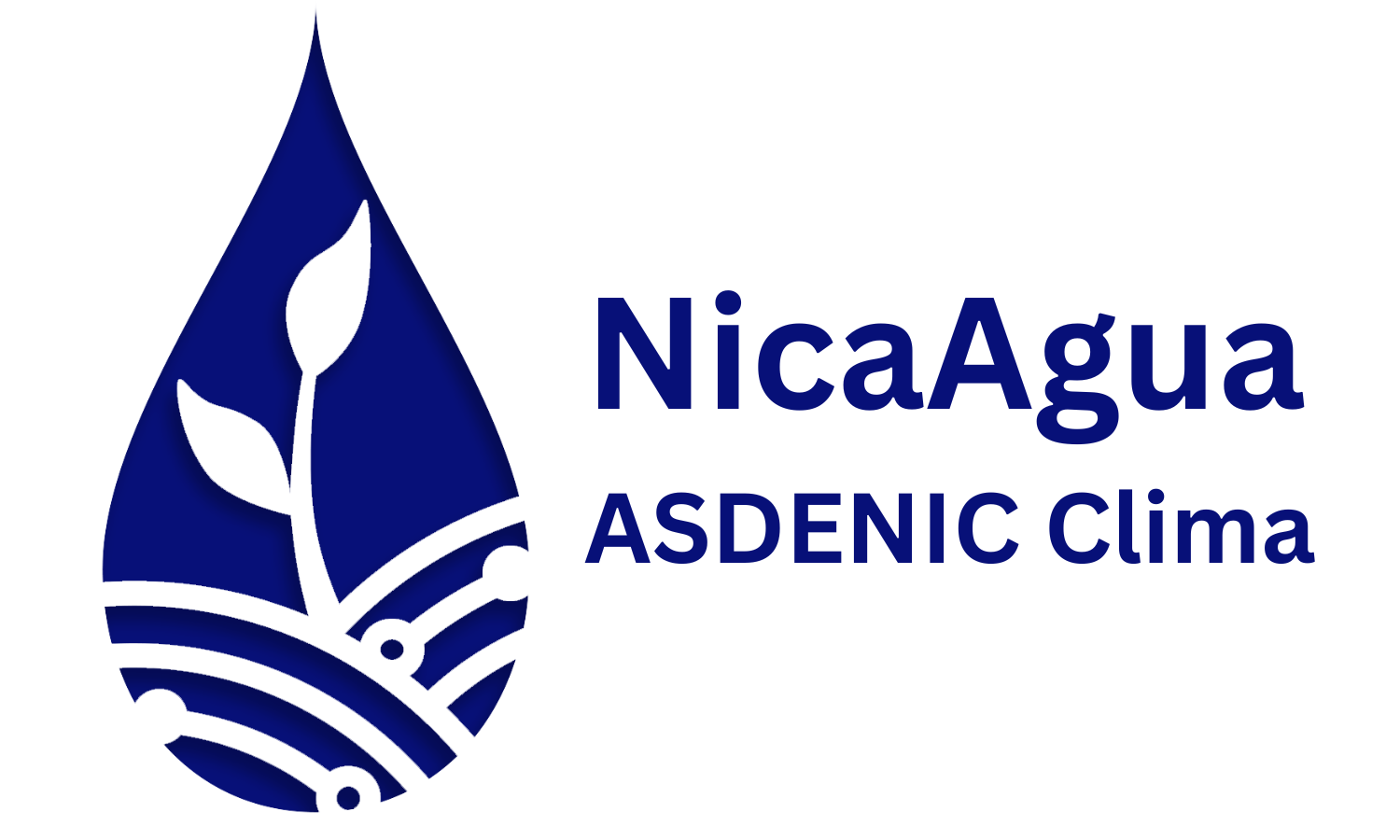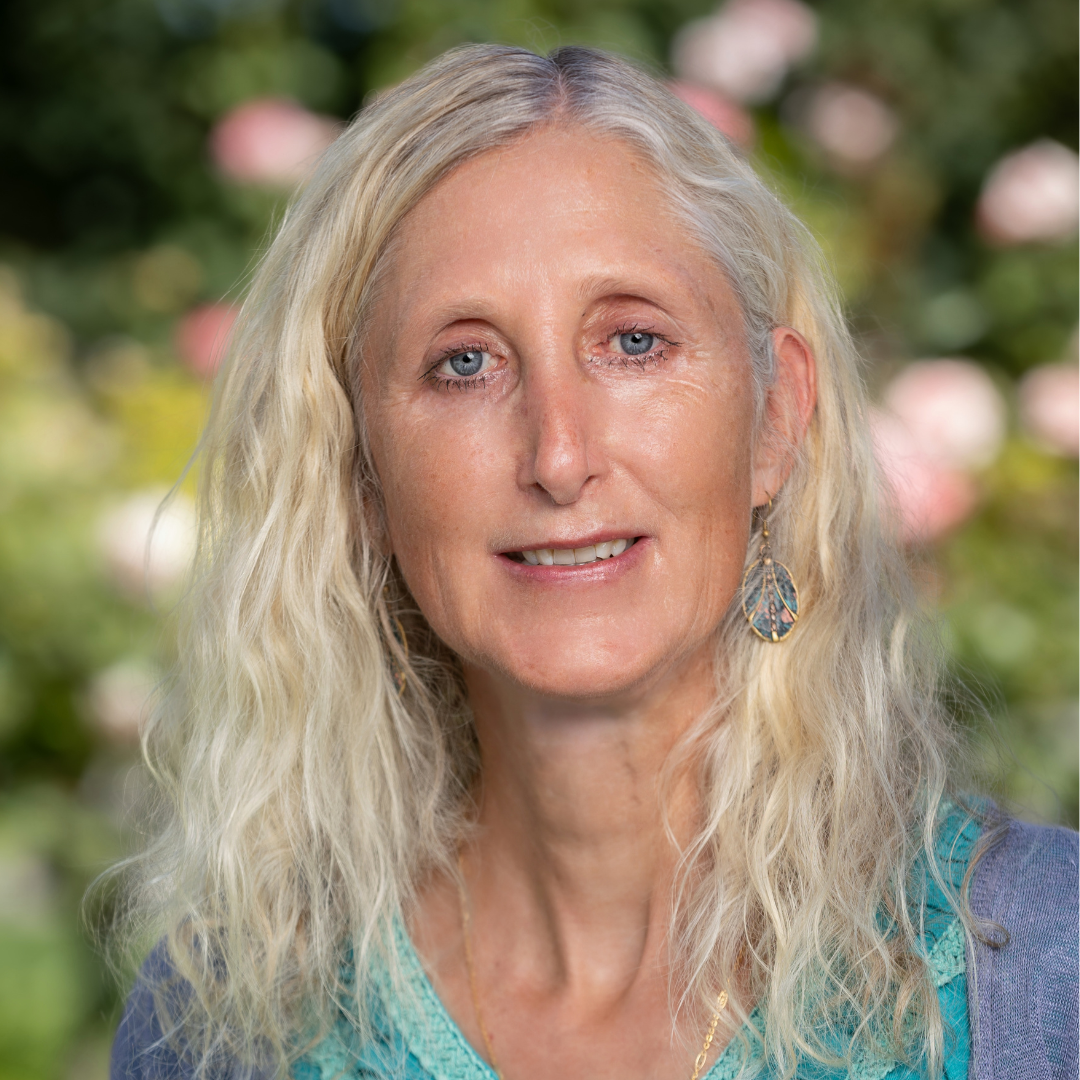Water & Climate Justice Events
- December 9-13, 2024Students Present at 2024 American Geophysical Union ConferenceThe Initiative’s Iris Stewart-Frey co-mentored six students in the Water and Climate Justice Lab to present their research at the American Geophysical Union conference in Washington D.C., including Dana Johnson (Civil, Environmental and Sustainable Engineering ‘25) and Environmental Studies & Sciences majors Samantha Lei (‘26), Elyse Kenyon (’25), Stephanie Davis (‘25), William Alexander (‘26), and Emma Young (‘24). The students presented their work on mapping Concentrated Animal Feeding Operations (CAFOs) and assessing their impacts on groundwater in the Central Valley, conducting a domestic well testing program in the Central Valley, assessing rainfall changes in Northern Nicaragua, and analyzing the ethical and engineering perspectives of the 2023 levee failures in the Pajaro Valley. All posters reflected the environmental justice dimensions as well as scientific aspects of the students' projects and were very well received. The students engaged in lively discussions with other researchers and walked away with many new ideas. SCU colleagues who co-mentored some of these students included Rocio Lilen Segura, Ed Maurer, and Aria Amirbahman from Civil, Environmental & Sustainable Engineering; Jake Dialesandro and Will Rush of Environmental Studies & Sciences; and David DeCosse of the Markkula Center for Applied Ethics.
- November 11 and 18, 2024Environmental Justice Lunch & Learn Seminar at SCU School of Engineering
The Initiative’s Rocio Lilen Segura in partnership with the American Society of Civil Engineers (ASCE) Student Chapter at SCU organized a two-part Lunch & Learn series to emphasize the role of environmental justice (EJ) in engineering. The events showcased real-world applications of EJ principles and offered students insights into how they can contribute to sustainable and equitable solutions. The first Lunch & Learn, held on November 11, featured Roxanne Reimer from the Community Water Center in Watsonville. She shared impactful projects addressing water justice and community resilience. This session aimed to inspire students by showcasing ongoing efforts outside the university, demonstrating the critical role of community-led initiatives in addressing environmental challenges. The second Lunch & Learn, held on November 18, focused on SCU’s interdisciplinary projects that integrate EJ principles into engineering practice. Students learned about two innovative initiatives:
- The NicaAgua Climate App: A climate adaptation tool designed to help communities in Nicaragua tackle pressing environmental challenges and enhance resilience against climate change. Presenters included Iris Stewart-Frey (ESS), Allan Baez Morales (Frugal Innovation Hub), and students Arturo Torres Torres Landa (CSS ’26) and Tanmay Singla, M.S. (CSS ‘24).
- The Pajaro Levee Project: A community-centered initiative addressing flood risk management through the lens of environmental justice. Speakers included David DeCosse (Markkula Center for Applied Ethics), Iris Stewart-Frey (ESS), Rocio L. Segura (CESE), and students Karina Martin (CESE, ’25) and Anna Krebs (CESE, ’25).
- November 1, 2024Artificial Intelligence and Environmental Justice
The Initiative’s Iris Stewart-Frey and Tseming Yang presented at the AI and the Environment Conference, hosted at SCU by the Markkula Center for Applied Ethics and Next 10 on November 1. The conference convened researchers, developers, activists, businesspeople, and regulators to address the growing impacts of artificial intelligence (AI) on sustainability. Stewart-Frey highlighted the environmental justice dimensions of increasing water demand from data centers in water-starved regions and their contributions to intensifying the global water crisis in the global south and historically marginalized regions. Yang spoke about the role that environmental law and regulation might play in addressing the environmental impacts of AI development and deployment. See the recording here.
- September 30th, 2024State EPA and Water Board Leaders Visit Central Coast to Learn about Drinking Water Contamination
The Initiative’s Iris Stewart-Frey and collaborator Jake Dialesandro from the Water and Climate Justice Lab supported a collaborative effort that included the California Rural Legal Assistance, the Community Water Center, and Monterey Waterkeepers to share experiences and research directly with the U.S. Environmental Protection Agency and drinking water decision makers. On September 30th, EPA Region 9 administrator Martha Guzman, State Water Board Chair Joaquin Esquivel, and State Senator John Laird, among others, met with multiple communities in the Salinas Valley advocating for clean drinking water solutions. Community leaders gave powerful testimonies about the challenges of living with water contaminated by nitrates while emphasizing the critical need for stronger nitrate regulations to prevent further damage to community health. It is critical for decision-makers to meet with residents in the impacted communities, as it makes it easier for local leaders to share their concerns and show people in the EPA and state why we need to strengthen regulations like Agricultural Order 4.0 to protect communities against nitrate contamination across California.
- September 9 and 10, 20244th Global Congress on Climate Change (GCCC-2024)The Initiative’s Iris Stewart-Frey gave a keynote presentation on “Community-academic partnerships to support climate adaptation to recent and future hydroclimatic shifts” at the 4th Global Congress on Climate Change (GCCC-2024) in Lisbon in September. In her address, she highlighted the possibilities of connecting the work of the climate science community to efforts at strengthening climate resilience on the ground, especially in the Global South. She also called on the climate science community to provide the resources for science-based decision-making on local scales, using the collaboration around the NicaAgua climate app at SCU as a case study.
- September 4, 2024Workshop on Climate Change and Technology
Women producers, from the San Luis community of Northern Nicaragua, participated in a workshop on how to use the NicaAgua climate app to help participants make informed decisions and adapt to changing weather conditions. The app was created by the Initiative’s Iris Stewart-Frey in collaboration with SCU’s Frugal Innovation Hub. The workshop methodology was practical and participatory, starting with the installation of the mobile application on participants' devices, and a detailed demonstration of the use of the application, followed by discussions exploring ways in which participants could apply the forecasts of the weather in their daily lives. In addition, to advance the collaboration between ASDENIC and the Initiative’s Food and Justice Program to promote diversification strategies among small farmers, the participants visited plots to evaluate the possibility of growing strawberries, turmeric, or ginger.
- May 30, 2024PFAS and Emerging Contaminants in Drinking Water Serving California Tribes
The Initiative's Iris Stewart-Frey, along with Clare Pace (UC-Berkeley Water Equity Science Shop), Daniel Beene (University of New Mexico), and Tedde Simon (Tribal Liaison, UC Berkeley) organized and moderated a one-day conference at SCU on shallow groundwater contamination near tribally managed lands in California from PFAS, which are often described as persistent organic pollutants or "forever chemicals." Keynote speakers were Otakuye Conroy-Ben (Oglala Lakota), a leading researcher on PFAS contamination on Tribal lands nationally and Gregg Castro (Salinan/ Rumsien-Ramaytush Ohlone), Charlie Toledo (Towa), and Shaun Livermore (National Tribal Water Council, Poarch Band of Creek Indians) on Tribal perspectives and priorities. The conference provided opportunities to discuss what is currently known about the issue and facilitated conversations about opportunities for collaboration among PFAS researchers, Tribal community members, and policy advocates. Presenters described current research efforts and water quality data. Tribal community members spoke about how research can support diverse community needs, and all participants envisioned actionable research to support advocacy and policy change. The conference was sponsored by the Initiative, the Water Equity Science Shop at UC-Berkeley, SCU’s Office of Diversity and Inclusion and Inclusive Excellence Initiative, the Environmental Justice Data Fund, the University of New Mexico METALS SRP, and the SCU Department of Environmental Studies and Sciences. Research coordinator Maria Eugenia Flores-Gomez and undergraduates Samantha Lei, Stephanie Davies, and William(Ivy) Alexander supported the conference.
- May 13, 2024Climate Science, Participatory Transdisciplinary Approaches, and the NicaAgua Climate App
The Initiative’s Iris Stewart-Frey gave an invited presentation at Stanford University’s Civil Engineering Department on climate science, participatory transdisciplinary approaches, and the development of a climate app to build capacity in drought-vulnerable Central America regions. Her talk focused on efforts to center community-based participatory approaches to learn which metrics matter to stakeholders, and to strengthen locally-led climate mitigation and adaptation efforts. She described how the NicaAgua climate app was developed by a transdisciplinary team for local capacity building. Much of this work has been done in collaboration with Ed Maurer (SCU Civil, Environmental, and Sustainable Engineering), Kerstin Stahl (University of Freiburg), Hugo Hidalgo (University of Costa Rica), Allan Baez Morales (SCU Frugal Innovation Hub), Qiuwen Li (SCU Art and Art History), Raul Diaz (CII-Asdenic) and 20 SCU undergraduate and graduate students from Environmental Studies and Sciences; Civil, Environmental, and Sustainable Engineering; Computer Engineering; Art; and Web Design.
- May 8, 2024Understanding Climate Change and Supporting Climate Resilience In Nicaragua
The Initiative’s Iris Stewart-Frey, Frugal Innovation Hub Director Allan Baez Morales, and community partner CII-ASDENIC were invited to present at a meeting of local government representatives in Esteli/Nicaragua on the NicaAgua climate app. The discussion centered on efforts to build local capacity for climate resilience and the development of new functionalities that will put current weather into the context of climate change and provide alerts for local action. SCU students Ifran Mohammed (CESE, ‘26), William Alexander (ESS ‘26), Briana Guingona (ESS ‘25), Arturo Torres Torres Landa (CESE, ‘26), Sara Wheeler (Web Design, ‘25), Melody Trinh (Web Design ‘24), and Tanmay Singla and Harsh Zota (both Computer Engineering ‘24) are working on these new functionalities within the Climate, Community Engagement, Design and Development Teams under the guidance of Stewart-Frey, Baez Morales, Ed Maurer (CESE, SCU, EJ&CGI), and Qiuwin Li (SCU Art and Art History). Together with CII-ASDENIC the team is planning and funding a series of upcoming workshops on capacity building and the user experience in Nicaragua for a new release.
- November 16, 2023, December 15, 2023, and January 25, 2024Three Smallholder Farmer Workshops Build Capacity around the NicaAgua Climate App
In order to continue strengthening capacities to mitigate the negative impacts of climate change that put food and water security at risk, ASDENIC in collaboration with the Initiative's Iris Stewart-Frey and SCU collaborators facilitated three workshops in five communities in the Condega region (northern Nicaragua). The workshops included familiarization with and feedback on the NicaAgua forecasting app the SCU-ASDENIC partnership has developed, and that assesses climate variability and change for decision-making. The workshops also featured a reflection moment between the smallholder farmer participants and the SCU research team, joining virtually, as well as hands-on training. Smallholder farmers shared what they interpreted from climate graphics and what information was most needed, giving impetus for further design and development of the NicaAgua app.
- October 11, 2023Research, Innovation, and Diné Science Synergistically Addressing Water Challenges
A campus visit by Dr. Ranalda Tsosie, Assistant Professor at New Mexico Tech and Diné leader, provided a full day of opportunities for interdisciplinary engagement on Native American approaches to science for faculty, staff, and students. Thousands of Diné people living in the Tsétah area in northeastern Arizona and surrounding communities are suffering the effects of the legacy of uranium mining and lack of infrastructure, leading to widespread wellwater contamination by arsenic and uranium. Dr. Tsosie gave a presentation on a research framework that incorporated the Diné indigenous approach with Western scientific approaches to identify solutions for water contamination issues. The event was moderated by the Initiative's Iris Stewart-Frey and Jessica Luna (Native American Coalition for Change) with a welcome by Dean Daniel Press. Following her presentation to over 150 in-person and online attendees were a reflection circle with students and faculty, a lunch with representatives from social justice units on campus, and an afternoon roundtable discussion on community-engaged innovation with engineering faculty in the Frugal Innovation Hub. The event was sponsored by the Initiative, the Native American Coalition for Change, the NorCal Network for Environmental Justice, tUrn, the Inclusive Excellence Initiative, the Office for Diversity and Inclusion, and the Ignatian Center.
- October 4, 2023Interdisciplinary Discourse on Water and Sanitation Justice
In today’s developed world, water and sanitation are taken for granted. However, not far from modern cities, large investments in water infrastructure left out vulnerable communities (e.g. lower income and BIPOC communities), and rising costs have made a connection to functioning water systems ever more elusive. A presentation by Khalid K. Osman, an Assistant Professor in the Civil and Environmental Engineering Department at Stanford University, offered a societal-technical system approach to the provision of water and sanitation, focusing on how to center justice in the decision-making process to move from inequality toward equality, equity, and justice. The discussion, which was moderated by the Initiative’s Iris Stewart-Frey and C.J. Gabbe (Environmental Studies and Sciences), explored what combination of factors led to the creation of this unjust system. An interdisciplinary roundtable with members of Environmental Studies and Sciences along with Civil, Environmental, and Sustainable Engineering followed Dr. Osman’s presentation and considered what is the path forward towards water justice. Funding for this event was provided by the Initiative, SCU’s Department of Environmental Studies and Sciences; SCU’s Department of Civil, Environmental and Sustainable Engineering; and SCU’s Office for Diversity and Inclusion.
>>watch the video (audio begins at 4:45)
- June 11-14, 2023Progress on Community-Based Climate Forecasts for Nicaraguan Smallholders Presented at CUAHSI Conference
The Initiative’s Iris Stewart-Frey, colleagues Ed Maurer (SCU Engineering) and Allen Baez Morales (SCU Frugal Innovation Hub), community partner Raul Diaz (CII-ASDENIC), as well as student researchers Briana Guingona (Environmental Studies & Sciences), Alex Avila and Turner Uyeda (Civil, Environmental, and Sustainable Engineering), and Gautam Chitnis (Computer Engineering) presented a poster of their work on climate change forecasts, information, and adaptation in Central America at the Consortium of Universities for the Advancement of Hydrologic Science (CUAHSI) biannual conference. Many parts of Central America have experienced warming over recent decades, accompanied by greater frequency of drought during the time of boreal summer (June-August), disrupting critical crop cycles and contributing to food insecurity. As a response, the team has developed an automated system to download 15-day and seasonal forecasts, which, together with metrics from a local weather station, feed into a lightweight app (NicaAgua) that can operate on a mobile phone and delivers graphical and text summaries of the forecasts. As climate change amplifies, the aspiration is that accessible, skillful, and effectively communicated climate forecasts can help with climate change impact mitigation strategies.
- June 10, 2023Youth Leaders for TRT’s Modesto Park Equity Initiative Host Community Day
The Initiative helped support Tuolumne River Trust's (TRT) Park Youth Committee (PYC) to host a fun-filled day of free outdoor activities and community building at Robertson Road Park in Modesto. Families enjoyed lunch and recreational stations, while learning about what the PYC is doing to expand park access with riverside communities. In partnership with All Children Thrive, the Park Equity Project empowers youth and families to champion safe and accessible parks for all, promoting civic engagement and collaboration with local government. The Park Equity project is led by the PYC, composed of high school students and adult allies, which addresses pressing park equity issues in local neighborhoods with a vision to create a world where all children can thrive in safe and enjoyable parks. The PYC created a StoryMap to present their project to the city council.
- June 9, 2022Community Perspectives and Tribal Voices Part II
James Muller, Principal Environmental Planner for Integrated Regional Water Management Program and grant manager for the Bay Area Disadvantaged Community and Tribal Partners Project and Alexander Tavizon, Bay Area Tribal Project Manager, California Indian Environmental Alliance presented a preliminary finding in their assessment of the Bay Area Integrated Regional Water Management Program, followed by a panel discussion with Gregg Castro, [t’rowt’raahl Salinan/rumsien-ramaytush Ohlone] Culture Director of the Association of Ramaytush Ohlone (ARO), Kanyon “Coyote Woman” (Hahashkani) Sayers-Roods, [Mutsun-Ohlone] Two Spirit Indigenous relative, Co-Founder of CEO of Kanyon Konsulting LLC, and active leader in the Native Community and Charlie Toledo [Towa] Director of Suscol Intertribal Council, Napa CA. Organized and moderated by the Initiative’s Iris Stewart-Frey and Clare Pace (UC Berkeley), the event was co-sponsored by the Initiative, the Northern California Environmental Justice Network for Community-Academic Partnerships, SCU’s Office for Diversity and Inclusion, the UC Berkeley Water Equity Science Shop, Stanford’s Environmental Justice Working Group, and SJSU’s Department of Environmental Studies
- May 11, 2022Community Perspectives and Tribal Voices Part I
Bidtah Becker, Deputy Secretary for Environmental Justice, Tribal Affairs and Border Relations, CalEPA, and Heather Tanana, College Of Law, University of Utah discussed tribal water issues, including access, infrastructure, quality, operations and maintenance. The presenters discussed the history and status of tribal water access, as well as opportunities created by new funding from the federal Infrastructure Investment and Jobs Act and the state of California’s efforts to use its first-in-the-nation law establishing a human right to water to make this right a reality in Indigenous communities. Organized and moderated by the Initiative’s Iris Stewart-Frey and Clare Pace (UC Berkeley), the event was co-sponsored by the Initiative, the Northern California Environmental Justice Network for Community-Academic Partnerships, SCU’s Office for Diversity and Inclusion, the UC Berkeley Water Equity Science Shop, Stanford’s Environmental Justice Working Group, and SJSU’s Department of Environmental Studies.
- Feb 25-March 1, 2022Water Justice Presentation at 2022 American Association of Geographers Conference
Professors Iris Stewart-Frey, Ed Maurer and undergraduate Kenny Joseph presented their research on climate and water insecurity issues in Northern Nicaragua at the largest annual scientific meeting for professional geographers.
Climatic shifts and household water security in northern Nicaragua
- October 11, 2021Just not enough or not just enough? Water distribution under climate change
Iris Stewart-Frey shared case studies and discussed the equity of sharing water resources as water grows scarce and demand grows. How can we think about equity and what are potential solutions? The presentation started discussing California but later expanded to other regions.
- October 2, 2021The Water Project
A public talk by Dr. Iris Stewart-Frey (Environmental Science) and Dr. Ed Maurer (Civil Engineering). Discussed the concepts of water and climate justice using the San Joaquin Valley and the Bay Area as an example. This talk was followed by a presentation on the disparate impacts of climate change on global communities. The talk ended with some ideas how to become active for greater water and climate justice. Professors Stewart-Frey and Maurer are faculty collaborative member of the Environmental Justice and the Common Good Initiative
- July 8, 2021Water, Climate, and Equity Panel: Collaborations for Environmental Justice in Northern California
This virtual panel highlighted the work and collaborations of long-term water justice organizations, local government entities, and academic partners in Northern California. Panelists shared best practices to document and reduce inequities in water access and affordability, flood risk, uneven exposures to water pollution, and in partnerships.
- Drinking water well vulnerability underground water sustainability planning. Darcy Bostic, Pacific Institute
- Climate Change and Coastal Risks in Santa Cruz, California. Dr. Tiffany Wise-West, Sustainability and Climate Action Manager, City of Santa Cruz and Dr. Costanza Rampini, Environmental Studies Dept., San José State University
- Community-based research partnerships in environmental justice communities in the Central Coast and San Joaquin Valley. Heather Lukacs, Community Water Center
- Driving policy changes in addressing nitrate pollution in Central Valley domestic wells through the CV-SALTS program. Marisol Aguilar, CA Rural Legal Assistance and Iris Stewart-Frey, Santa Clara University and Environmental Justice & Common Good Initiative
More than 60 participants enjoyed the lively discussion, resource sharing, and an optional coffee chat. This event was organized by the Northern California Network for Community-Academic Partnerships in Environmental Justice.
Photo Credit: ATA
- May 4, 2021Research supports planning for climate change adaptation and sustainable water resource management in Nicaragua
A workshop co-organized by community partner organization ASDENIC in northern Nicaragua and the Water and Climate Justice program of the EJ&CGI (Iris Stewart-Frey and Ed Maurer) focused on climate change adaptation and sustainable water management in 13 communities surrounding an ecological park in northern Nicaragua. The workshop brought together representatives from water committees, the mayor’s office in Condega, ASDENIC, and academic researchers. Stewart-Frey and Maurer presented research work examining climatic trends and their impacts on water resources, and the exploration of locally relevant measures of drought, water availability, and the nature of the midsummer drought to support planning for the ecological park that serves as the source for all local water as well as adaptation strategies for better understanding and managing these changes. In the planning portion of the workshop, water committee representatives discussed monitoring and adaptation strategies and how further research may support efforts towards greater water security, making drinking water safer, and better protection of the ecological park and watershed.
- April 27, 2021Advocating for Communities Facing Groundwater Contamination
Iris Stewart-Frey (ESS, EJ&CGI) and Lilah Foster (ESS ‘21, Clare Boothe Luce scholar) together with partners from the California Rural Legal Assistance (CRLA) were invited to present their research on nitrate groundwater contamination at a recent Central Valley-wide CV-SALTS workshop held by the Central Valley Water Board. Nitrates and pesticide contamination of shallow groundwater is widespread in the region and presents a serious risk to human health. Many disadvantaged communities are not connected to public water systems and draw their water from domestic wells tapping contaminated water. The Water Board is currently establishing the regulatory framework for the CV-SALTS program, which, instead of regulating individual nitrate emitters, seeks collaborative approaches from emitters towards nitrate reduction and provisions of safe drinking water for established management zones.
- April 19, 2021A Water is Life Panel: Indigenous People & Other Protectors
The panel was moderated by Iris Stewart-Frey, with participants from Nigeria (Anthony Akpan, Pan-African Voices for Environment), Seattle, and SCU (Teresia Hinga, Founder Circle of Concerned African Women Theologian).
- June 1, 2020Seminar: How just is water allocation under drought in the SF Bay Area?
ESS student Jackie Rogers (Env Sci '20) presented her research under a Hackworth Grant on the ethics of how we distribute water when water is short. Participants heard from experts from water agencies and environmental groups and found out where Bay Area voters stand on conserving water for others and the environment. This seminar was co-sponsored by the Markkula Center for Applied Ethics, the Department of Environmental Studies and Sciences, and the Environmental Justice and the Common Good Initiative. Jackie was mentored by Iris Stewart-Frey (ESS)
- March 3 and April 20, 2020Climate Justice
Ed Maurer and Chad Raphael presented and led discussions on climate justice for the tUrn Climate Crisis Research Group of SCU faculty and staff, and for a tUrn-organized event for the wider SCU community.
>>See Climate Justice 2020 Slides
- August 12 and 14, 2020Research team presented at the Modesto General Plan meeting.
Research team Iris Stewart- Frey, Chloe Gentile-Montgomery and Meghan Adams presented a few maps and ideas regarding data and communities at two meetings that TRT and Catholic Charities convened on August 12 and 14 for Modesto Disadvantaged Unincorporated Communities.
08,2020 Modesto Research Contribution to Community Action Plan
Image: Mapping of wells and nitrate contamination 2010-2020
- January 22 and 23, 2020Building an SCU Working Group for Environmental Justice
We convened SCU faculty and staff to introduce the Initiative, explore research collaborations with each other and with community organizations, and learn about the Initiative’s Small Grants Program to support faculty research (including with students).

